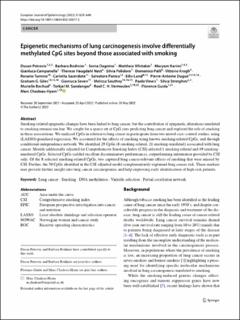Epigenetic mechanisms of lung carcinogenesis involve differentially methylated CpG sites beyond those associated with smoking
Petrovic, Dusan; Bodinier, Barbara; Dagnino, Sonia; Whitaker, Matthew; Karimi, Maryam; Campanella, Gianluca; Nøst, Therese Haugdahl; Polidoro, Silvia; Palli, Domenico; Krogh, Vittorio; Tumino, Rosario; Sacerdote, Carlotta; Panico, Salvatore; Lund, Eiliv; Dugué, Pierre-Antoine; Giles, Graham G; Severi, Gianluca; Southey, Melissa; Vineis, Paolo; Stringhini, Silvia; Bochud, Murielle; Sandanger, Torkjel M; Vermeulen, Roel CH; Guida, Florence; Chadeau-Hyam, Marc
Peer reviewed, Journal article
Published version
Permanent lenke
https://hdl.handle.net/11250/3033045Utgivelsesdato
2022Metadata
Vis full innførselSamlinger
Originalversjon
10.1007/s10654-022-00877-2Sammendrag
Smoking-related epigenetic changes have been linked to lung cancer, but the contribution of epigenetic alterations unrelated to smoking remains unclear. We sought for a sparse set of CpG sites predicting lung cancer and explored the role of smoking in these associations. We analysed CpGs in relation to lung cancer in participants from two nested case–control studies, using (LASSO)-penalised regression. We accounted for the effects of smoking using known smoking-related CpGs, and through conditional-independence network. We identified 29 CpGs (8 smoking-related, 21 smoking-unrelated) associated with lung cancer. Models additionally adjusted for Comprehensive Smoking Index-(CSI) selected 1 smoking-related and 49 smoking-unrelated CpGs. Selected CpGs yielded excellent discriminatory performances, outperforming information provided by CSI only. Of the 8 selected smoking-related CpGs, two captured lung cancer-relevant effects of smoking that were missed by CSI. Further, the 50 CpGs identified in the CSI-adjusted model complementarily explained lung cancer risk. These markers may provide further insight into lung cancer carcinogenesis and help improving early identification of high-risk patients.

